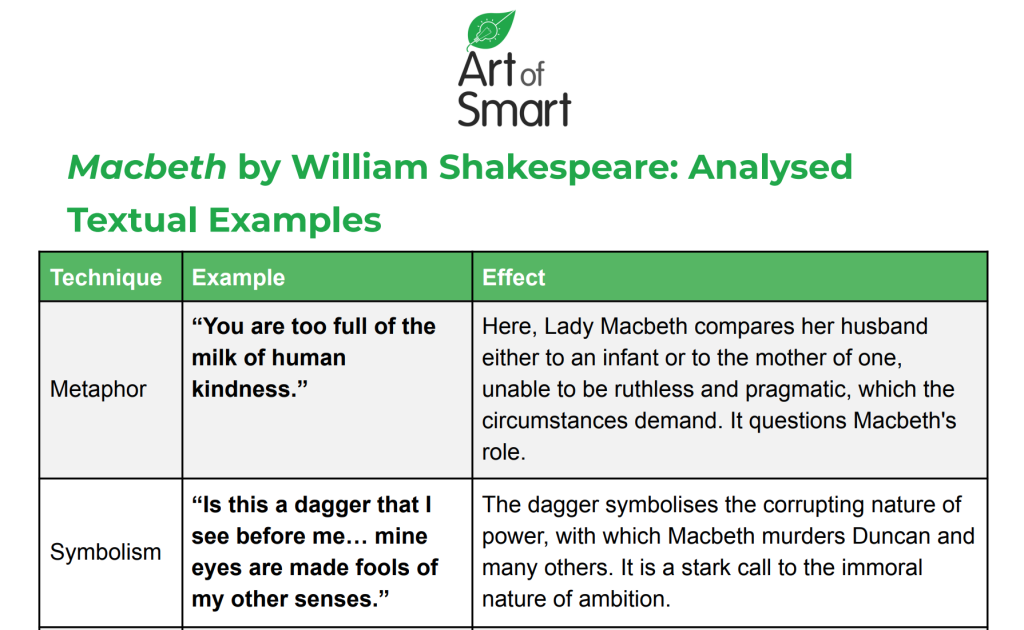“Is this a dagger I see before me?” This is usually the way most people view ‘The Scottish Play’, also known as Macbeth — which you probably need to write an analysis for if you’re reading this article (we’ve got everything you need with a summary, the key characters and themes).
Using its proper name is even considered bad luck among actors. With its mysticism and murderous rampage, most people see the play as long and repetitive, perhaps — although it is one of the greatest Shakespearean plays.
So if you’re studying this text and need some guidance writing an essay analysis on Macbeth, keep reading!
Macbeth Summary
Key Characters in Macbeth
Context
Themes Explored in Macbeth
Analysis of Macbeth
Summary of Macbeth
The action begins on the eve of a battle between the Scottish army and a Norwegian rebellion, when the two famed generals of King Duncan, Macbeth and Banquo, meet three mysterious women (witches) that have previously cast a prophecy in a storm.
For more analysis on Shakespeare’s use of pathetic fallacy in Macbeth, check out our guide on Pathetic Fallacy!
The witches predict the Coronation of Macbeth as King of Scotland, and promise Kingdoms to all of Banquo’s sons. The men leave the witches in scepticism, and defeat the rebel MacDonwald.
For his outstanding performance in battle, Macbeth is awarded with the title of ‘Thane of Cawdor’ by the King himself, an item that the witches had also promised to the General. It is at this moment that Macbeth begins to question his scepticism in the prophecy.
Macbeth returns to his camp, and tells of the prophecy to his wife. He is still reluctant, but his wife pushes him to act on the prophecy. She is thrilled at the prospect of power.
King Duncan comes to visit Macbeth’s camp to congratulate him, and in the darkness of night, Lady Macbeth drugs the two guards standing watch over Duncan, and Macbeth kills him.
The sons of Duncan, Malcolm and Donalbain, are also at the camp, but immediately flee for their lives once the body is found, in fear they might be killed also.
This rash action, however, draws suspicion on them, and they are blamed for the murder along with the guards (Lady Macbeth placed the bloody knives close to their intoxicated bodies to frame them). Macbeth has moral doubts about the murder he committed and regrets it in his mind.
Macduff leaves for England to raise an army, as he suspects Macbeth of the murder, while the latter is crowned king. Despite being plagued by ghostly apparitions and guilt, Macbeth arranges for Banquo and his son Fleance to be assassinated in a hunt, but Fleance escapes as his father is killed. This leaves a potential heir to Banquo as a possible challenger to the throne.
Macbeth fears for his power yet again and seeks the witches, who tell him that no man born of woman can take away his crown. He thus begins persecutions, burning women and children at the stake, in case one is the future challenger to Macbeth.
Macduff’s wife and family are also burned. Upon hearing this, Macduff and Malcolm move against Macbeth with an army from England.
Macbeth believes that he will be safe in Dunsinane, however, he is warned by the witches that the nearby forest is ‘moving closer’ (enemy soldiers have camouflaged themselves with vegetation and tree branches to get closer to Macbeth and his castle).
Macbeth is killed by Macduff in a final, bloody battle, as we learn he was born of cesarean birth. Malcolm is crowned king, and declares peace.
Key Characters in Macbeth
Macbeth
Macbeth should be viewed as a tragic hero rather than a villain. Yes, he is taken over by ambition and power, but who wouldn’t? This is exactly the point Shakespeare is trying to make. Macbeth eventually comes to regret his actions, much before the end of the play: “full of scorpions is my mind…”
Motivated by the witches’ prophecy and influenced by his ambitious wife, Macbeth succumbs to the allure of becoming king. This descent into ambition leads him down a dark and treacherous path, where guilt and paranoia consume him.
Shakespeare’s portrayal of Macbeth delves into the depths of the human psyche, exploring themes of ambition, morality, and the consequences of unchecked desires. Macbeth’s tragic journey serves as a cautionary tale, reminding us of the dangers of succumbing to our darkest ambitions and the inevitable consequences that follow.
Lady Macbeth
Lady Macbeth is Macbeth’s own counterpart. With her strong will and persuasive nature, Lady Macbeth manipulates her husband into fulfilling their shared ambition for power, even at the cost of committing heinous crimes. However, her guilt eventually overwhelms her, leading to her tragic downfall.
Lady Macbeth’s character explores themes of ambition, guilt, and the complexities of gender roles. She serves as a cautionary example of the destructive consequences of unchecked ambition and the toll it takes on one’s conscience.
The Witches
Aside from being emissaries from the supernatural, the witches are the perfect personification of the superstitious and religious climate of the time. The struggle between Catholicism and Protestantism in England truly made audiences question their religious beliefs. The witches are thus a mirror of this in the play.
With their eerie and uncanny abilities, they deliver prophecies that influence the actions of the characters. Their grotesque appearance, association with darkness, and manipulative nature contribute to their unsettling presence.
The Witches tempt Macbeth with promises of power, fuelling his ambition and moral corruption. They symbolise the destructive power of temptation and blur the line between fate and free will.
Macduff
Macduff can be considered the true hero of the story. He is able to see through Macbeth’s deception, and avenge his family ultimately.
Macduff’s resilience and courage are evident as he leads the charge against Macbeth, ultimately playing a pivotal role in his downfall. With his unwavering commitment to righteousness, Macduff represents the triumph of justice over tyranny and serves as a beacon of hope in the face of adversity.
Banquo
Another foil to Macbeth, Banquo represents everything that Macbeth isn’t. His moral attitude towards power is admirable, although a hint of jealousy can be sensed in Act III Scene I.
Note that not even Banquo is completely immune to ambition. He just doesn’t pursue it at such great lengths as Macbeth does.
Malcolm
The son of King Duncan, that flees upon his murder as he fears for his life. He is later persuaded by MacDuff to command an English army and get his throne back. The rightful heir to king Duncan.
Donalbain
Duncan’s second son, he helps his brother in his quest to avenge his father.
King Duncan
He is the model ruler introduced in the play. Macbeth will be comparing himself to Duncan across the play, and always falling short of his benevolence.
Duncan isn’t really a noteworthy character by himself, but rather a tool for Macbeth to realise he takes his ambition too far.
Context
Given the scarce popularity of King James I, The play can be seen as either a criticism to the King’s rule, or as a warning to anyone wanting to overthrow him. This is particularly significant, as around the time that the play was written, the Gunpowder Plot was discovered, and the perpetrators sentenced to death.
Setting
The play is set in feudal Scotland, so if you were ever tempted to say that the characters assassinated or otherwise killed in Macbeth’s persecutions were the moral opposite of the tragic hero, think again.
At that time, the only way to earn a shred of respect was to backstab and kill. Who knows how many unfortunate souls Duncan had to murder to be King by the beginning of the play.
You’ll find that Shakespeare isn’t trying to single out Macbeth and his wife as evil. On the contrary, he is showing us that betrayal and murder is common; Malcolm effectively kills half his countrymen to defeat Macbeth and become king during the final battle at Dunsinane, and he doesn’t even get the honour to chop off his head. McDuff does.
Themes Explored in Macbeth
Macbeth is one of those plays that can be argued to have an innumerable amount of messages as a whole. Here are the two principal ones that will always be in the exam:
Power and Ambition
Shakespeare makes it clear that all characters are vulnerable to this in Macbeth. Rather, he invites audiences to question to what extent the pursuit of ambition is legitimate.
Although Macbeth’s reign was bloody and unjust, a just man that brought peace to Scotland (Malcolm) also had to take various lives to do so. Is murder justifiable then? Shakespeare wants each one of us to find our own limit to ambition.
At the beginning of the play, Macbeth is a loyal and respected soldier who has just won a great battle for his king. However, he becomes consumed by his ambition and desire for power after hearing the witches’ prophecy that he will become king. This leads him to commit regicide and take the throne, but it also sets him on a path of destruction and paranoia.
Lady Macbeth also embodies the theme of power and ambition in the play. She is the driving force behind Macbeth’s actions, encouraging him to take the throne and urging him to commit murder. Her own ambition and desire for power is so strong that she is willing to sacrifice her own humanity and morality.
The play also explores how power corrupts those who hold it. Macbeth becomes increasingly paranoid and ruthless as he tries to hold on to his power, and he ultimately becomes a tyrant who is feared by his subjects. The play suggests that once a person has tasted power, they will do whatever it takes to hold on to it, even if it means committing atrocities.
In addition to exploring the destructive effects of power and ambition, the play also suggests that there is a natural order to things that must be respected. Macbeth’s actions upset the balance of nature, leading to chaos and disorder. This is reflected in the unnatural events that occur throughout the play, such as the stormy weather, the ghostly apparitions, and the witches’ prophecies.
The Supernatural and Our Beliefs
The witches’ prophecy is very telling of the religious struggles of the time. Yet centuries after, Shakespeare manages still to interrogate audiences in their belief in fate.
One of the key themes related to the supernatural is the idea that our beliefs can shape our reality. In the play, Macbeth’s belief in the witches’ prophecies leads him to believe that he is invincible and untouchable. This belief fuels his ambition and ultimately leads to his downfall. Similarly, Lady Macbeth’s belief that she can wash the blood from her hands highlights the power of belief and the human desire to escape the consequences of our actions.
The theme of the supernatural is also used to explore the idea of fate and destiny. The witches’ prophecies suggest that Macbeth’s fate is predetermined, and that he has no control over his future. This leads to a sense of fatalism and inevitability throughout the play, as Macbeth and Lady Macbeth try to fight against their destiny and change the course of events.
Another important aspect of the theme of the supernatural is the idea that there are forces in the world that are beyond human understanding and control. The witches, for example, represent a mysterious and otherworldly power that is beyond the realm of human experience. This highlights the limitations of human knowledge and the idea that there are aspects of the world that are beyond our understanding.
How to Analyse Macbeth in 3 Steps
Step 1: Choose your example(s)
The best way to choose an example is to choose a technique. Remember you must include stylistic devices (how images and words are arranged in a text in order to produce meaning), and aesthetic features (elements that prompt a critical response from the reader) in your essays to gain the most marks.
The following quote from Macbeth comments on both Theme and Paradox, which are aesthetic features:
“So foul and fair a day I have not seen.”
Step 2: Identify your techniques
The key part of the quote here is ‘foul and fair’. Putting the quote into context, this mantra-like phrase has already been repeated a couple of times by the witches, whom Macbeth has not yet met.
The simple fact that this phrase is already so popular, and we’re not even half way through Act I indicates that this is a pivotal theme.
All in all, it is a paradox that equates good to evil; in essence, puts them on the same plane and connotes their similarities in people’s words and actions.
Check out our top Macbeth English External exam practice questions for your EA prep!
Step 3: Carry out your analysis
Always be ready to ask yourself what the author intended you to feel/respond emotionally by reading the example quote. This will make sure that you tackle an important part of the analysis, which is the effect on the reader.
William Shakespeare induces audiences to question their stance on the moral character of ambition by utilising the theme of good versus evil. The witches’ mantra-like phrase “fair is foul and foul is fair”, echoed by Macbeth himself, “so foul and fair a day I have not seen” (Act I) equates benevolence with malevolence. By putting these two distinct, paradoxical concepts on the selfsame plain, Shakespeare figuratively gives permission to Macbeth to pursue his ambition in a frenetic and relentless manner, whatever the cost. This is because, in the tragic hero’s mind, the line between good and bad is blurred when it comes to ambition.
Step 4: Practise with sample essay questions
Check out our guide on how to ace Unit 4 of QCE English!
Even if you’ve written an incredible essay, if you don’t respond to the question or stimulus that you’re given in an exam, you could miss out on a Band 6.
Luckily for you, we’ve got plenty of practise questions on our resources page for you to use!
In Year 11? Here are 20 Practise Questions for the Common Module: Reading to Write to get you started!
Need some help analysing other texts?
Check out other texts we’ve created guides for below:
- All the Light We Cannot See
- Lord of the Flies
- Jane Eyre
- In Cold Blood
- To Kill a Mockingbird
- Run Lola Run
- The Book Thief
- 1984
- Things Fall Apart
- Mrs Dalloway
You can also have a look at the articles we’ve written on other plays by Shakespeare below:
- Much Ado About Nothing
- Romeo and Juliet
- Hamlet
- King Lear
- A Midsummer Night’s Dream
- King Richard III
- Othello
- The Merchant of Venice
- The Tempest
Plus, check out our Band 6 Guide to Year 11 Advanced English Module B: Critical Study of Literature for study recommendations!
Are you looking for some extra help with your analysis of Macbeth?
We have an incredible team of English tutors and mentors!
We can help you master your book analysis of Macbeth by taking you through the summary, key characters and themes. We’ll also help you ace your upcoming English assessments with personalised lessons conducted one-on-one in your home or online! Ace Macbeth with a personalised English North Shore tutor!
Need help preparing for the English external exam? Check out our one-on-one Brisbane English tutoring!
We also have an awesome tutoring team in Victoria, including 1 on 1 P-12 tutoring in Essendon
We’ve supported over 8,000 students over the last 11 years, and on average our students score mark improvements of over 20%!
To find out more and get started with an inspirational English tutor and mentor, get in touch today or give us a ring on 1300 267 888!
Vittorio Manessi is an Art of Smart tutor based in Queensland studying environmental science. He was one of the first Year 12 students to study under the new ATAR system in Queensland. He enjoys Maths, Science, English and Ancient History and is keen to share his knowledge of the QCE by making awesome resources.






